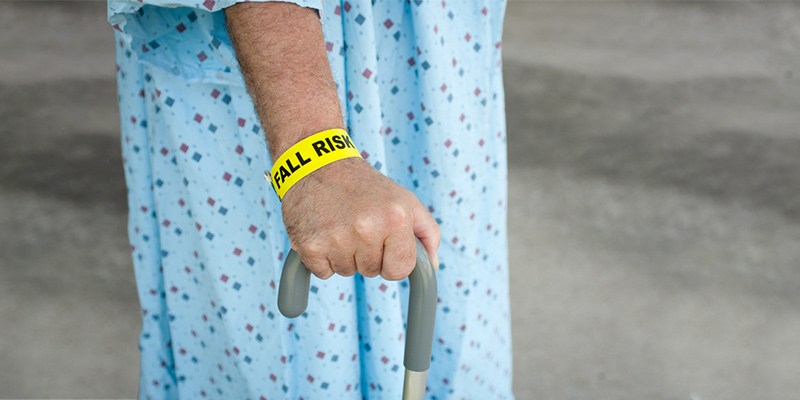Antidepressants and opioids double the risk of falls and fractures in older people
By Candy Gibson
 HEALTH Antidepressants, opioids, antiepileptic medicines and antipsychotics were found to increase the risk of hip fractures in older Australians.
HEALTH Antidepressants, opioids, antiepileptic medicines and antipsychotics were found to increase the risk of hip fractures in older Australians.Taking antidepressants or opioids more than doubles the risk of a fall and hip fracture in older people, according to a paper published in Australian Prescriber.
Lead authors Professor Libby Roughead and Dr Kerrie Westaway, both from UniSA, outline the impact of mind-altering drugs on older people and their contribution to falls.
Psychotropic drugs are used to treat a wide range of conditions including depression, pain and dementia but their side effects include drowsiness, dizziness and blurred vision – factors which increase the likelihood of falls and fractures, the researchers say.
“Antidepressants, opioids, antiepileptic medicines, benzodiazepines (used to treat anxiety) and antipsychotics all increase the risk of hip fractures,” Prof Roughead says.
“Combining them increases the risk even further, up to five times in the case of starting antidepressants and anxiety medicines together.”
This equates to one extra hip fracture for every 17 patients aged 80 years and over who are treated for a year.
“We suggest to prescribers they consider whether patients really need some of their medicines anymore. For example, an SSRI* antidepressant may no longer be required if a patient is fully recovered from depression. Similarly, it may be possible to stop an antipsychotic in someone with dementia. Doctors should try stopping one medicine at a time, reducing it slowly over weeks or months,” Prof Roughead says.
 The Advertiser 3 June 2019
The Advertiser 3 June 2019This risk of falling can be lowered by reducing medicine use, exercising more and using other interventions such as occupational therapy and podiatry, the researchers say.
The research is already making a difference through the Veterans’ Medicine Advice and Therapeutic Education Services (Veterans’ MATES) project, which aims to improve the use of medicines and related health services in the veteran community.
A spokesperson from the Department of Veterans’ Affairs (DVA) says that through the Veterans’ MATES program it has contacted elderly clients who have been prescribed these medicines and asked them to visit a doctor and seek to have their medicines reviewed if they have concerns about their risk of falling.
“The educational material provided to these clients has highlighted the importance of other strategies to minimise the risk of falling, including the need for vision checks, ensuring high quality footwear is worn, removing trip hazards around the home as well as the value of engaging in exercise programs,” a DVA spokesperson says. “Targeted educational material has also been provided to GPs treating these clients.”
“This research has been extremely beneficial in understanding the different risks that medicines have on causing injurious falls within the veteran community.”
Researchers used data from the DVA in a matched case-control study, comparing 8828 veterans with hip fractures with 35,310 people of the same age and gender, examining their medicine use in the previous six months. The average age of the cohort was 88 years and 63 per cent were women.
In 2018, an estimated 28,000 Australians over the age of 50 were hospitalised with a hip fracture. Of those, five per cent die in hospital and more than 10 per cent are discharged to an aged care facility.
Australians are among the highest users of antidepressants in the world, with about 10 per cent of the adult population taking them each day.
The Department of Veterans’ Affairs encourages veterans who are using these types of medications and are concerned about their risk of falling to discuss these concerns with their GP. Advice is also available on the Veterans’ Mates website.
*Selective serotonin reuptake inhibitors (SSRIs) are commonly used to treat depression.
Other Stories
- Research reveals droughts becoming the norm in more of SA
- How to get the nutrients you need without eating as much red meat
- Asthmatics failing to cough up for medicines, putting health at risk
- Antidepressants and opioids double the risk of falls and fractures in older people
- From the Vice Chancellor
- Achievements and Announcements
- Exhibition honours a leader who shaped the nation – Bob Hawke
- 21st Century hedonism at MOD. asks … what’s your pleasure?
- How uni is helping Kyle in and beyond the pool
- Major breakthrough to help clean up toxic PFAS pollution
- Students to help defence personnel prepare for global sporting events
- Colombia defies old stereotypes during eye-opening study tour
- Fulbright researcher unpacks future learning
- The latest books from UniSA researchers
- MOD. Hedonism launch and National Reconciliation Week




